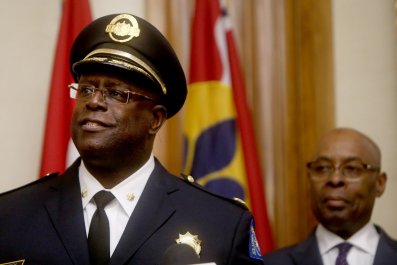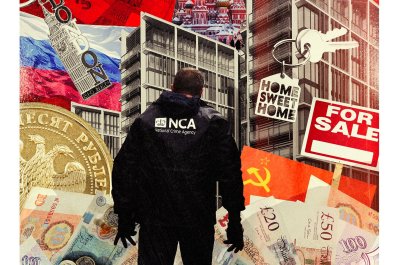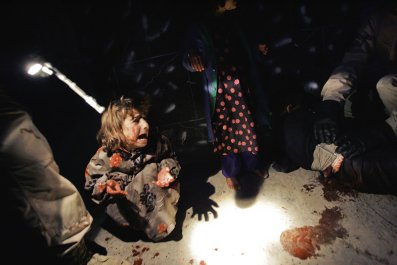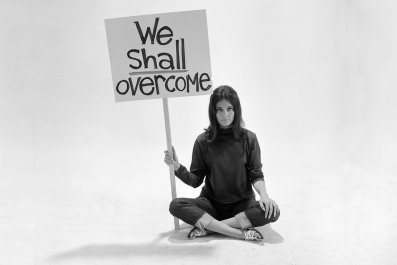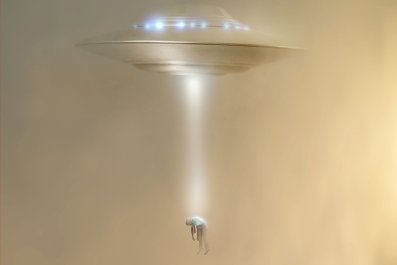There are several beats to hit when talking about MGMT.
Invariably, you must mention Wesleyan, the liberal arts college (usually characterized with descriptors like "quirky" or "free-spirited") where Andrew VanWyngarden and Ben Goldwasser formed their psych-pop duo a decade and a half ago. Then you mention how kaleidoscopic indie staples like "Kids" and "Electric Feel" soundtracked hipster parties during the final days of the George W. Bush administration. You might slyly allude to liberal hallucinogenic drug use. And you politely express bewilderment at the band's increasingly proggy and experimental follow-up albums, 2010's Congratulations and 2013's MGMT.
"People are going to develop a narrative no matter what," VanWyngarden, the band's lead singer and guitarist, told Newsweek.
But MGMT's devilishly fun new album, Little Dark Age, which was released February 9, is excellent in part because it eludes trite narratives. It's the band's poppiest album since their 2008 debut Oracular Spectacular without feeling like a retread. It's strange and freaky (check the morbid Ariel Pink collab "When You Die") without reveling in indulgence. It's rooted in the sociopolitical dread of the past two years but not overtly political. And, VanWyngarden insists, it was actually pretty fun to make despite the process dragging on for years (which allowed ample time for self-doubt and writer's block).
During a recent stop in Paris, VanWyngarden chatted with Newsweek about Little Dark Age, being compared to Steely Dan and the surprising joys of Soviet-era synth-pop.
It has been four-and-a-half years since your last album came out. Why the break?
We took 2015 off. We really needed that. Since 2007, we hadn't had an extended period to just be normal people: stay at home, listen to records, cook and reconnect with friends. Ben moved to L.A., and I moved into a house that I had been working on renovating for like three years. I got way more into record collecting since I had a place to keep records.
From what I've read, my sense is that you had a really rough time making this album, and it dragged on and on.
That's not quite that accurate. I wouldn't say we had a rough time making it at all. I've heard people say that about our third record. This one, once we figured out what sounds we were into, it came really quickly and we had a lot more fun songwriting than we had since we were in college. Of course, there's the moments of uncertainty or anxiety that come when you're in the creative process.
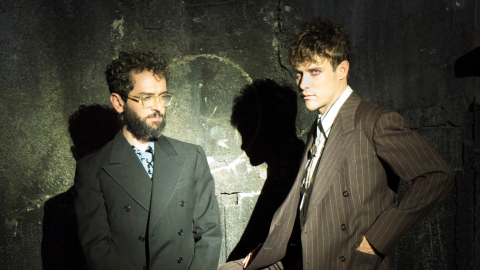
What were you listening to while making Little Dark Age? There seems to be a crazy range of influences.
It was a few different phases that were pretty important to the sound of the album. One of them was an '80s Soviet synth-pop phase. I went to a website my friend showed me, and I found this small world of music that I never knew about or even had access to—electronic and synth music of the early '80s in Russia and Latvia and that zone. It just connected with me, even though I couldn't understand what they were saying. That was influential on songs like "Little Dark Age" and "Me and Michael."
I started DJing vinyl a lot more during the past few years. I would notice what things really got people dancing. When we were making songs, we wanted to be playful and make it fun to listen to the music. That was a change from the third album, when we were trying to make real anxious, claustrophobic, chaotic kind of sounds. It was fulfilling to do that, but this time we were challenging ourselves to connect with people, with the music and not cut ourselves off.
A lot of praise for your new songs seems to be hinged in a dismissal of MGMT's last album, and maybe Congratulations as well. Does it bother you that people seem to have misunderstood them?
It's totally natural that people would be confused or find them difficult. Ben and I have been fighting for like 10 years to establish ourselves as a band that can be any style and that people expect to come out with something different. People are going to develop a narrative no matter what. It doesn't really bother me. It was just fun this time to feel like we were returning to the roots of the band, in a way—music that inspired us when we met when we were 18 years old, like Talking Heads and Depeche Mode and Madonna and big '80s pop music.
What impact, if any, did Trump's election have on this album?
We made the album between spring of 2016 and spring of 2017. That year was a pretty wild ride. Just being manipulated by media and obsessively having to get the news every second—it almost felt like we were conditioning ourselves to expect and anticipate terrible things. It feeds itself and can really build into an unhealthy state. One way Ben and I realized we were able to break out of that is through humor and making music that was fun to listen to.
The day after the election was the first day of our second session with [producer] Dave Fridmann. It definitely set a strange and somber mood over the session. We ended up recording "Hand It Over" and "One Thing Left to Try" in that session. But we left that session not feeling all that great about it. We didn't want anything to be overtly political. But there's definitely an influence of the events in the music and in the lyrics.
If MGMT made a protest song, what would it sound like?
I would hope that it would sound like that Buffalo Springfield song.
"For What It's Worth"?
Yeah, yeah! That's a great one. I think what we want people to do is stop and think about what's going down. Even just that simple act of stopping and questioning things is really vital, and that fits into the technology theme on the album, too. I really feel like the technology that I'm so attached to and that I see other people completely dependent on—it sometimes serves to kind of chip away your daily life from moments when you would be thinking about things and drifting off or daydreaming or whatever. Thinking revolutionary thoughts. Questioning what's happening. That whole thing is a little bit dangerous.

My favorite song on the new album is "TSLAMP" ["Time Spent Looking at My Phone"], which has to be one of the most terrifyingly relatable pop songs ever.
That song idea came while I was driving around. I had a couple ideas from a dream. It felt like the gates were opened, in some way. But I think we wouldn't have been able to record a song like "Time Spent Looking at My Phone" while we were making our third record. There's kind of this humor to it—even though it's ultimately a messed up theme to sing about people and myself wasting their lives with this device.
Related: MGMT's "TSLAMP" is a weirdly great anthem about smartphone addiction
I read this profile of MGMT that ran in Uproxx last month. It described MGMT as "the millennial version of Steely Dan." What do you make of that comparison?
I think that's a flattering... That's a compliment, in my mind. That's an aspect of our band that doesn't get pushed as much. We're kind of big studio nerds, and we love recording. That's how Steely Dan was, too. That's definitely fine with me, being compared to Steely Dan.
Do you think your self-titled album will be heralded as a masterpiece like 30 years from now?
[laughs] I don't know. There was definitely a shift in how people talked about our second album that happened compared to when it came out. I think people might realize that [MGMT] was another identity of the band, the more experimental and studio-oriented side of the band.



